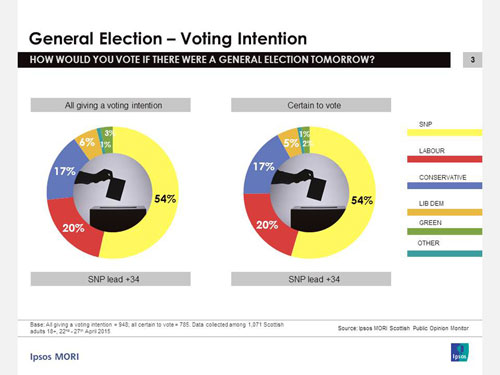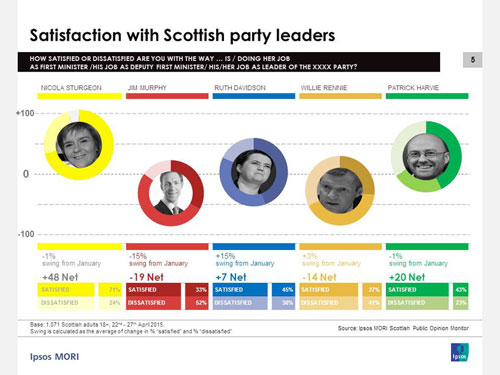SNP remains in a strong position as general election enters final week
SNP remains in a strong position as general election enters final week, but Labour could still benefit from tactical voting
As the general election campaign enters its final week, Ipsos MIORI’s new poll for STV News continues to show that the SNP is in a dominant position.
Among those who say that they would be ‘absolutely certain to vote’, 54% would support the Scottish National Party (SNP), a small increase of 2 points from our last poll in January. Support for Scottish Labour has fallen by 4 points and stands at 20% while 17% would vote for the Scottish Conservatives (up 5 points). The Scottish Liberal Democrats have seen support rise marginally to 5% (up by 1 point) while support for the Scottish Greens has fallen by 2 points to 2%.

While the poll represents further good news for the SNP ahead of the election, a close look at the data suggests caution in assuming that voters’ views are settled. Firstly, 22% of those who express a firm preference on our first voting question, report that they may change their minds about who to vote for before polling day, ranging from just 14% of those who intend to vote for the SNP, to 63% of those who currently back the Scottish Liberal Democrats.
Second, there are some signs that, if any tactical voting takes place, it may be most beneficial to Labour and the Liberal Democrats. While only 14% of respondents said that Labour are their ‘preferred party’, a further 30% report that they may vote for Labour if they thought they had a chance of winning in their constituency, including 35% of Conservative supporters and 34% of Liberal Democrats. The equivalent figure for the Liberal Democrats is 25% compared to 17% for the SNP and 15% for the Conservatives.
The majority of Scots also think that, if the SNP has some influence in the UK government after the election, then that would be a ‘good thing’ for Scotland (69%) and for the UK as a whole (60%). Unsurprisingly, SNP supporters are most positive about potential SNP influence, but the balance of opinion among Labour and Liberal Democrat voters is also favourable in terms of the impact on Scotland; 47% of Labour supporters think it would be a ‘good thing’ for Scotland, compared to 43% who think it would be ‘a bad thing’ and equivalent figures for Liberal Democrat supporters are 49% and 42%.
However, Labour and Liberal Democrat supporters are much less positive about the effect that SNP influence would have on the UK as a whole. On this question, 55% of Labour supporters think it would be a ‘bad thing’ for the UK, compared to 34% who day it would be a ‘good thing’. Liberal Democrats feel very similar, with equivalent figures of 55% and 32%.
In terms of satisfaction ratings for key leaders, First Minister Nicola Sturgeon remains Scotland’s dominant politician, enjoying a net satisfaction rating (the proportion satisfied minus the proportion dissatisfied) of +48%. Scottish Greens leader Patrick Harvie (+20%) and Scottish Conservatives leader Ruth Davidson (+7%) are the only two other leaders, from Holyrood or Westminster, to enjoy positive net satisfaction ratings.

Mark Diffley, Director at Ipsos Scotland said:
"We are now in the final week of campaigning ahead of the crucial election and the SNP is clearly consolidating its dominant position among voters in Scotland. While the numbers of seats each party will win next week remains unclear, it is likely that the SNP will make significant gains. For Labour, while support has fallen since our last poll in January, they will hope that those who remain undecided and those who are prepared to vote tactically, will back them and help to minimise the loss of seats. Reinforcing their position of strength, Nicola Sturgeon remains the most popular political leader in Scotland with 71% satisfied with her performance. The poll also confirms the growing popularity of Conservative leader Ruth Davidson, who attracts a satisfaction rating of 45%, far outstripping support for her party."
Technical Note
- Results are based on a survey of 1,071 respondents (adults aged 18+) conducted by telephone
- Fieldwork dates: 22nd April to 27th April 2015
- Data are weighted by: age, sex and working status using census data; tenure using Scottish Household Survey data; and public-private sector employment using Scottish Government Quarterly Public Sector Employment series data
- Where results do not sum to 100%, this may be due to computer rounding, multiple responses, or the exclusion of “don’t know” categories
- Results are based on all respondents (1,071) unless otherwise stated



